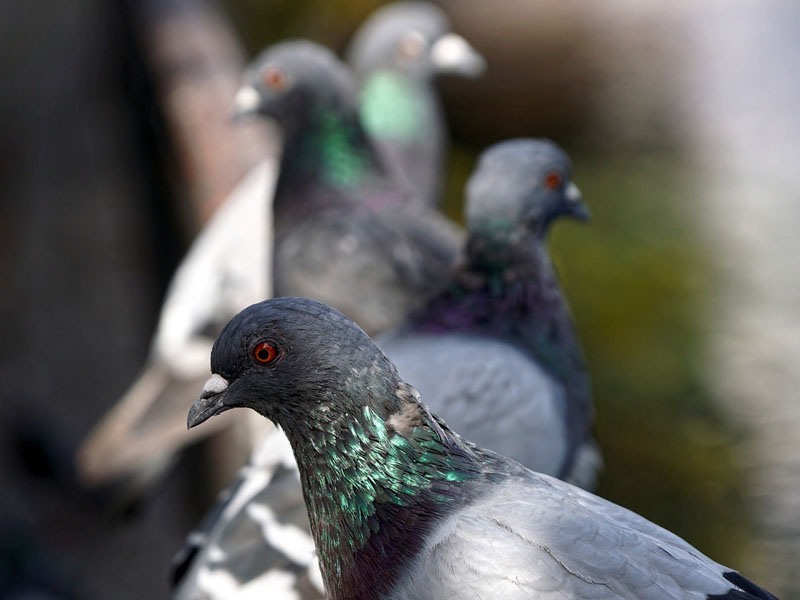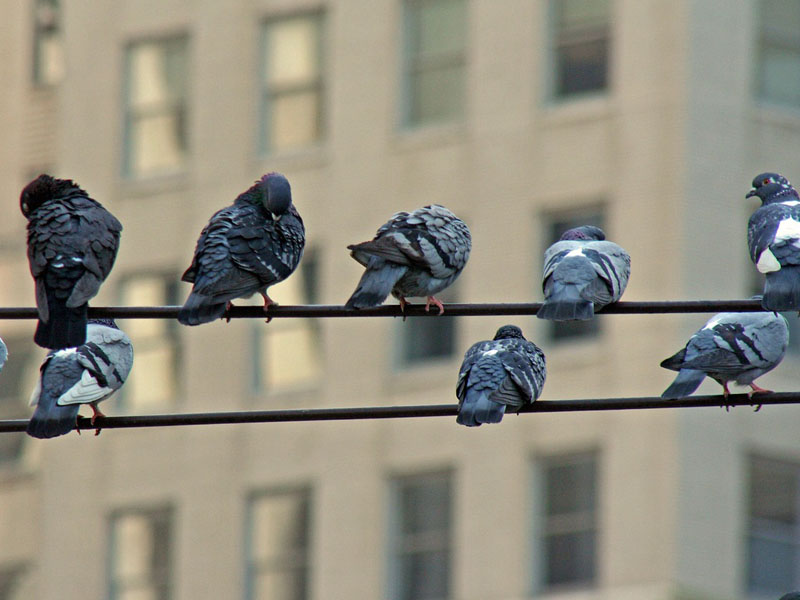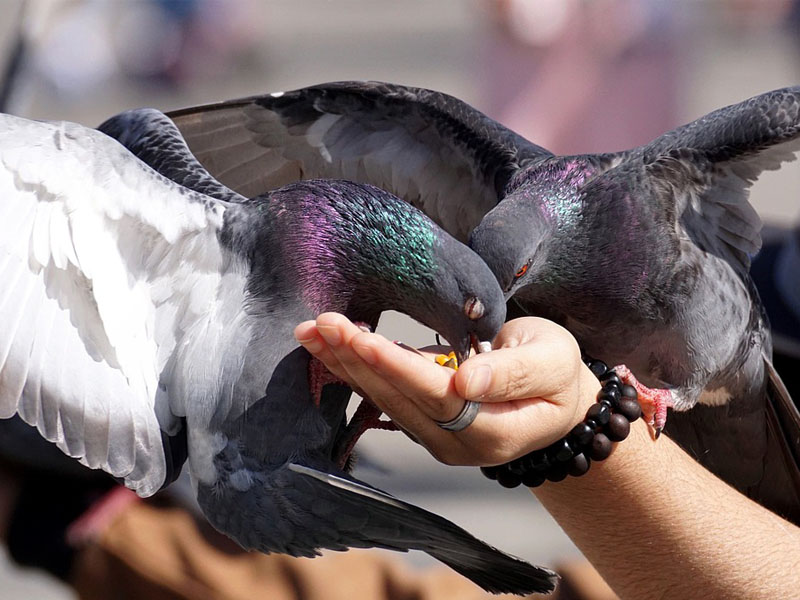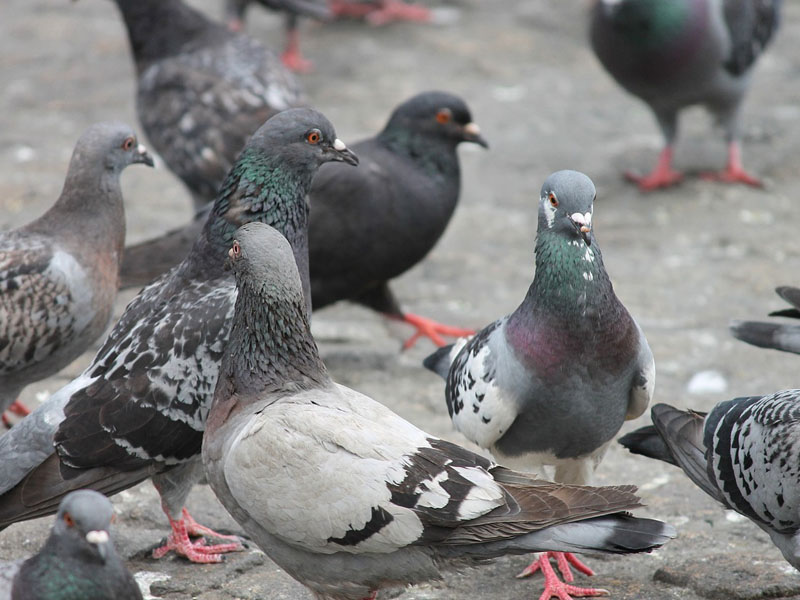Feral pigeons and other pest birds congregate in large numbers in locations that offer convenient access to food and shelter. Consequently, densely populated regions like the city and boroughs of London have gradually transformed into ideal habitats for pigeons seeking food and shelter.
London is estimated to be home to nearly three million pigeons, equating to approximately one pigeon for every three Londoners and the presence of so many birds bring with it a multitude of problems.
Why do pigeons thrive in urban settings like London?
All birds select roosting locations that provide sustenance for their survival. While many birds prefer the shelter and natural abundance of rural areas, where human populations are generally lower, certain pest birds, such as pigeons, have adapted to the modern world. They are undeterred by bustling crowds and have learned to scavenge among the remnants we humans leave behind. They fearlessly nest in seemingly inhospitable places like gutters, chimneys, and even drains.
With its multitude of buildings, a population of nine million residents, and over 20 million tourists visiting annually, London becomes a true haven for pigeons. The city offers a moderate climate and an abundant supply of food and shelter, making it unsurprising that pigeons flock to the capital in such large numbers.

Does London have a pigeon problem?
London undoubtedly faces a significant pigeon problem, boasting the highest pigeon population in the country. Flocks of pigeons can amass up to 500 birds, leading to a substantial accumulation of droppings, nest debris, and building damage. Each year, substantial sums of money are spent on repairing the harm caused by pigeons and implementing deterrent measures to prevent them from roosting on rooftops and within structures.
As previously mentioned, pigeons gravitate towards areas abundant in food and shelter, and London offers them a plethora of options. They have been known to nest in various structures, including railway stations, offices, multi-storey buildings, billboards, and private residences. Given the abundance of old and neglected buildings in the capital, finding a comfortable nesting spot is made even easier.
Pigeons don’t have to wander far to find a meal either. Well-intentioned tourists often enjoy feeding them, and the numerous overflowing bins scattered across the city are highly inviting.
Considering the sheer number of pigeons and the favorable living conditions London provides, it is clear that pigeons are here to stay. Consequently, effective bird control measures are essential. Bird control encompasses methods aimed at removing pigeons from buildings and deterring their return. Fortunately, harming pigeons is illegal in the UK, and there exist numerous humane strategies to keep them at bay.
Is a pigeon infestation dangerous?
It is undeniable that an untreated pigeon infestation can cause significant harm. The consequences extend beyond costly property damage and the deterioration of important historical structures throughout London; they also encompass a genuine health hazard to the population of London.
Feral pigeons carry diseases such as Chlamydia psittaci or Psittacosis, which can cause Ornithosis in humans – a distressing and potentially fatal infection. With three million pigeons present, the city becomes visibly saturated with the pathogens and harmful bacteria left behind in their copious droppings.
Disturbingly, pigeon droppings can become airborne when they dry. Although this poses a relatively low risk to healthy individuals, those with compromised immune systems or young children face considerably greater susceptibility.
Pigeon infestations are notorious for creating health and safety hazards. The accumulation of droppings on pavements and steps can transform into a slip hazard. Additionally, discarded nesting materials can amass within ventilation systems and chimneys causing blockages and posing a fire hazard.
Apart from the structural damage they inflict and the risks they impose on human well-being, pigeons are simply a bothersome nuisance. Countless homeowners and business operators in London can suffer the aftermath that pigeons leave in their wake.

How can I get rid of pigeons from my premises in London?
Dealing with pigeon problems on commercial properties in London is crucial to safeguard reputation, minimise costs, and address health hazards. Taking preventive measures to avoid infestations is essential. Fortunately, there are several tried and proven methods of bird control that can effectively deter pigeons from your property and prevent their return.
Falconry for bird pest control: Employing falconry, an age-old and humane solution, can effectively address pest bird issues. By introducing falcons or other birds of prey to regularly fly over the affected site for a period of several months, a clear message is sent to the pigeons that the area is dangerous territory. Given time, the pigeons will recognize the threat and vacate the premises. Falconry is safe, reliable, humane, and environmentally friendly, and has been successfully employed to rid buildings of pigeons throughout London.
Bird spikes
Bird spikes provide a humane method of pigeon control by preventing them from perching on roofs, gutters, chimneys, signage, and balconies. These spikes, consisting of blunt steel rods attached to a polycarbonate base, are designed to deter pigeons rather than harm them. Bird spikes are commonly used on both commercial properties and private residences.
Bird Netting
Bird or pigeon netting is a cost-effective and long-term method of bird control widely utilized on commercial buildings in urban areas like London. It deters pigeons from perching and nesting on structures. Bird netting is typically made from polyethylene wire and comes in various shapes, colours, and sizes. It is stretched to create a taut barrier and secured with high-quality steel fittings.
Remove their food supply
While it may be instinctive for humans to feed hungry pigeons, it only encourages larger flocks and exacerbates issues, particularly in densely populated areas like London. To address the problem, it is essential to discontinue feeding pigeons. Additionally, domestic bird feeders can attract more pigeons, further aggravating the situation. Although it’s admirable to support birds in outdoor spaces, in urban settings, bird feeders contribute to the pigeon problem. The simple lesson is to refrain from feeding birds if they become a nuisance to your business or residential property.
Implementing these measures will aid in effectively removing and deterring pest birds from your business premises in London while prioritizing humane and environmentally conscious practices.

Contact Pigeon Control Experts
We provide a diverse array of pest control solutions to address the needs of homeowners and business owners, ensuring effective eradication of pigeons and preventing their return.
Drawing upon our extensive expertise, we have found that employing a combination of methods provides excellent results in deterring pigeons from roosting on your property. Strategies such as falconry and the installation of bird spikes have proven to be highly effective.
With our range of services, we strive to provide holistic solutions that address the specific needs of home and business owners, ensuring effective pigeon control and long-lasting results.
Pigeon Control only uses humane methods to remove and deter pigeons from your home or business. Our team of experienced pigeon control specialists will assess the severity of the infestation and recommend the best course of action to remove the pigeons and prevent future infestations.
We also provide ongoing maintenance contracts to help ensure that your property remains pest-free. Our goal is to provide our clients with a comprehensive and effective pigeon control solution that is tailored to their specific needs.
If you’re experiencing pigeon problems, contact Pigeon Control today. Our team of experts will be happy to provide you with a free, no-obligation quote and answer any questions you may have about our services.
Contact us through our website or for 24-hour callout please call us on 0203 600 1045.

